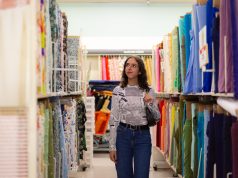Located inside the Little Haiti Cultural Center, there’s a small shop with gifts and jewelry originally from Haiti. Its owner, Mimi Sanon-Jules, used to have a thrift shop located in one of the most important streets in the neighborhood, but she had to vacate when the rent went up.
“When my lease was over, before a month, the owner said she’s not going to renew,” Sanon Jules said. “The only way she could renew my lease, I had to pay double and I said, ‘no way.’”
Her store, which was named best Thrift Shop by Miami New Times in 2016, is one of the many that have been displaced. Most have suffered income loss and culture shock.
“It’s not Little Haiti anymore,” Sanon-Jules said.
Haitians in Miami are starting to become familiar with displacement. As sea levels rise, gentrification is becoming the new normal in this community. Residents have started to move out to neighborhoods such as North Miami, Miami Lakes and even Homestead. Little Haiti’s culture is starting to vanish.
“It is kind of this traumatic shock for people,” said Jean-Luc Adrien from The Community Justice Project. “We’re the only area, the fabric of the community that they’ve known. Connections to their friends, families and work [are] kind of broken.”
Read Part 1 by clicking here. Read Part 2 by clicking here.
According to a report by the Earth Economic, the recently approved Magic City Innovation District could push out more than 3,000 households in Little Haiti. Collectively, these families would pay $68 million over 10 years in relocation expenses.
Bookstore owner Jean Mapou, who has received large offers to sell his store, is determined to maintain his heritage. In his store, he guards his Haitian culture, language and history — which is quickly disappearing.
“Helping those victims to understand what’s going on around them is not easy,” said Mapou. “But we are doing our best.”
Leaders in the community, like Mapou, say they will be persuading developers and investors that it’s worth providing residents meaningful participation in their projects and housing they can afford. There should also be compensation for displaced business owners, he said.
































